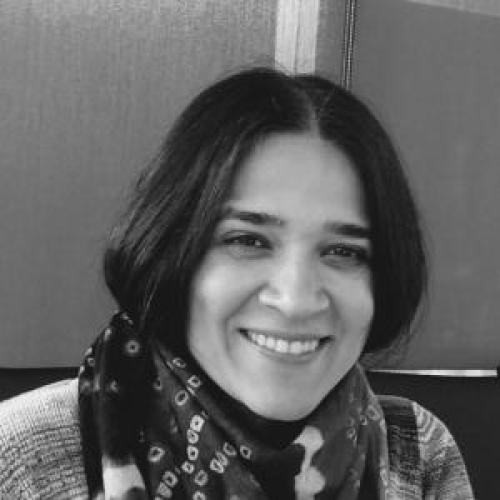Physics
Ph.D.
University at Buffalo, Buffalo, NY
2009

Pratibha Dev received her PhD in theoretical condensed matter physics at the University at Buffalo. She joined the Howard University in 2015, where she is currently a Professor in the Department of Physics and Astronomy. Her research spans a range of topics across disciplinary boundaries. She is currently investigating novel 2D quantum materials, topological insulators, hybrid nanomaterials for potential applications in solar cell technology and the physics of defect centers in solids of interest in nanoscale sensing and quantum information.
Ph.D.
University at Buffalo, Buffalo, NY
2009
M.S.
Miranda House College, Delhi University, India
B.S.
Miranda House College, Delhi University, India
We are theoretical physicists, interested in investigating different properties of bulk, nanostructured and composite materials using ab-initio computational methods. We are interested in an array of topics at the interface of Condensed Matter Physics, Quantum Chemistry and Materials Science, including novel 2D materials and their stacks, hybrid nanomaterials, organic crystals and the physics of defect centers in solids.
Level: Undergraduate CoursePrerequisites: Calculus and AlgebraMaterial Covered: Special Relativity, Quantum Mechanics and their applications in different fields of PhysicsBook(s) Used: Modern Physics by Serway, Moses & Moyer (3rd Edition)
Level: Graduate and Undergraduate CoursePrerequisites: Quantum Mechanics, Electromagnetic Theory, and (some) Thermal & Statistical Mechanics (all prerequisites - at least at the undergraduate level)Material Covered: Very briefly, the following will be covered:Static and dynamic aspects of structural properties of crystalline materialsElectronic properties of solidsSemiconductor PhysicsBook(s) Used: (1) Introduction to Solid State Physics by Kittel (7th edition or later) (2) Solid State Physics by Ashcroft & Mermin (1st edition)
Level: Graduate CoursePrerequisites: Undergraduate-level Quantum Mechanics (or at the minimum, Modern Physics), Electromagnetic Theory, and Mathematical Physics (all prerequisites - at least at the undergraduate level)Material Covered: This is the first of the two-semester course. We will cover a range of topics over the course of two semesters (not necessarily in this order): brief discussion of old quantum theory, wavefunctions and Schrodinger’s equation, abstract formulation of quantum mechanics, Dirac notation, operators, vector spaces, symmetry, spins, addition of angular momentum, approximation methods (perturbation theory and variational method) and scattering theory, etc. Along the way, we will look at the application of quantum mechanical ideas to explain phenomena within different fields of physics and chemistry. Book(s) Used: There is no textbook for the course. I will try to make my lectures as self-contained as possible. However, you are encouraged to acquire one or more of the following books to supplement the notes (a non-comprehensive list): Quantum Mechanics, C. Cohen-Tannoudji, B. Diu and F. Laloe: Two volumes, good for self study. Highly recommended. Quantum Mechanics, L.I. Schiff: A solid old-fashioned graduate textbook. Lectures on Quantum Mechanics, G. Baym: A very good graduate textbook, with a concise and sophisticated exposition. Modern Quantum Mechanics, J.J. Sakurai: Another good book, with good examples.The Feynman Lectures on Physics, vol. III, R.P. Feynman: Great for gaining physical insights. Quantum Mechanics, F. Schwabl: Concise text.
Level: Graduate CoursePrerequisites: Graduate-level Quantum Mechanics - I (PHYS-220)Material Covered: This is the second of the two-semester course. We will cover a range of topics over the course of the semester: addition of angular momentum, approximation methods (perturbation theory and variational method) and scattering theory. Book(s) Used: There is no textbook for the course. I will try to make my lectures as self-contained as possible. However, you are encouraged to acquire one or more of the following books to supplement the notes (a non-comprehensive list): Quantum Mechanics, C. Cohen-Tannoudji, B. Diu and F. Laloe: Two volumes, good for self study. Highly recommended. Quantum Mechanics, L.I. Schiff: A solid old-fashioned graduate textbook. Lectures on Quantum Mechanics, G. Baym: A very good graduate textbook, with a concise and sophisticated exposition. Modern Quantum Mechanics, J.J. Sakurai: Another good book, with good examples.The Feynman Lectures on Physics, vol. III, R.P. Feynman: Great for gaining physical insights. Quantum Mechanics, F. Schwabl: Concise text.
Level: Graduate Course
Prerequisites: None, though it is preferred that the students will have already started engaging in research as this will form a convenient topic for their presentations, though it is not strictly necessary.
Material Covered: The lectures will cover elements of storytelling (e.g., exposition, conflict/driving moment, rising/falling action, climax/critical event) and their application to the development of your presentation. We will also focus via different exercises on verbal/ nonverbal communication skills, including but not limited to: posture, voice volume/ projection, speed of delivery, intonation, pauses, hand gestures, physical movements and eye contact. Other items we will cover: technical aspects of slides - colors, effects, animations, etc; how to field questions; how to prepare oneself in general.
Book(s) Used: There is no textbook for the course. Lectures will be self-contained and based on my notes. Copies of notes as well as supplementary materials/reading will be distributed, when appropriate.
National Science Foundation
W. M. Keck Foundation
Air Force Office of Scientific Research
Research Scientists:
Ivan Naumov
Suryakanti Debata
Sajjan
Sharmila Shirodkar
Graduate Students:
Cyrille Armel Sayou Ngomsi
Sai Krishna Narayanan
Benjamin Edun
Alumni:
Tamanna Joshi (Ph.D. Degree; 2022)
Christina McBean (Undergraduate Research; Senior Thesis)
Priyanka Manchanda (Postdoctoral Researcher 2018-2021)
Pankaj Kumar (Postdoctoral Researcher 2019-2020)
Olasunbo Farinre (M.S. Degree)
Bipul Poudyal (Undergraduate Research)
Kevaughn Johnson (Undergraduate Research)
Naomi Haddock (Undergraduate Research)
Emmanuel Igban (Undergraduate Research)
Annual NRC/ASEE Postdoctoral Research Publication Award, 2016 for the article:“Stabilizing graphene-based organometallic sandwich structures through defect engineering,” Phys. Rev. B, 91, 035436 (2015). This is an award by Fellowships Office of the National Academies of Sciences, Engineering, and Medicine.
Chemistry Division Award (NRL), 2015 for the article: “van der Waals screening by single-layer graphene and molybdenum disulphide,” ACS Nano, 8 (12), 12410-12417 (2014). This citation honors superior quality of research accomplished and technical writing.
As an NRC fellow, I worked in the Naval Research Laboratory, Washington D.C. from 2012-2015.
The aim of the EMPOWER fellowship was to allow international researchers to work in Ireland, creating and supporting a vibrant research atmosphere in Ireland. As an EMPOWER Fellow, I worked in University College Dublin, Dublin, Ireland from 2010-2012.